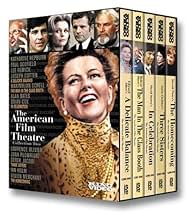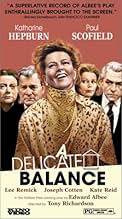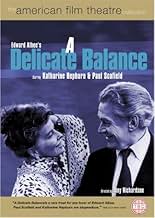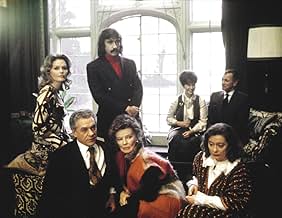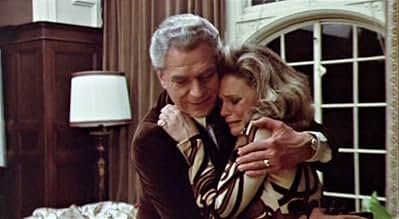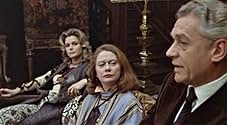A well-to-do Connecticut family is upended when the grown daughter's godparents, seized by a nameless terror, decide to come live with them.A well-to-do Connecticut family is upended when the grown daughter's godparents, seized by a nameless terror, decide to come live with them.A well-to-do Connecticut family is upended when the grown daughter's godparents, seized by a nameless terror, decide to come live with them.
- Awards
- 1 nomination total
Featured reviews
After seeing this I tried to figure out why it is considered at all above the ordinary. The characters are: a domineering wife, a docile husband, an alcoholic sister, a daughter working on her fourth divorce, friends in a crisis of anxiety. I suppose this exaggerated mix is interesting to a playwright, but maybe not to an audience, at least to this member of the audience. My interest flagged while spending over two hours watching these unhappy people work through their long-standing problems.
Katharine Hepburn as Agnes, the wife, is, well, Katharine Hepburn. That is good as far as it goes, but her performance here seemed overly rehearsed--every body movement and spoken line struck me as anything but spontaneous. If I had not known that it was Paul Schofield as Tobias, the husband, I would not have found his performance all that remarkable. Kate Reid's performance as Claire, Agnes' alcoholic sister, might play well on stage, but here it struck me as embarrassingly overacted, perhaps exaggerated by the extreme close-ups and silly script elements like the accordion playing. Lee Remick did add some spark as Julia, the much-divorced daughter. Betsy Blair, as Edna, a supposed friend, gave little indication why Agnes and Tobias should find her of value (not sure if this was a result of her performance or the script). Joseph Cotton, as Harry, Edna's husband, turned in the most sincere performance, making me think that he has been under-appreciated as an actor.
I liked the question raised of when love for friends equals, or even trumps, inherent family bonds. This play gives credence to Robert Frost's quote, "Home is the place, when you have to go there, they have to take you in," and submits that this quote is not as nearly a given when applied to friends.
I found some character behaviors unfathomable. Consider Julia's reaction to Harry and Edna's taking over her bedroom. She was insulted by this from the beginning, but about midway through the play she went ballistic and finally flew upstairs in a rage. Later Harry reported that Julia had become hysterical and was blocking a doorway with her arms outstretched. I fully expected that in subsequent scenes Julia would be carted off to the nut house, but no, the next morning she was calm and collected. When Harry and Edna came in to the house uninvited, with the intention of moving in, they appeared to be disconnected from reality. But then overnight they became rational.
Spending time with these people would be something that I would not look forward too, but neither did I want to spend two hours with them in this movie, being confined to a house with nothing to entertain but conversation. On the other hand, I would not want to spend time with George and Martha of, "Who's Afraid of Virginia Woolf" either, but I found that movie spellbinding.
Rather than the filming of a stage play, this movie is an adaptation. No matter how director Richardson tries to break up the monotony by mixing close-ups and two shots and using different vantage points for the camera, he cannot overcome the essential staginess, particularly given Albee's stricture that his text was not to be changed. I think that the filming of a stage production of this might have been preferable, since there is no pretense there of a realistic setting. It was a delicate balance for the family in this play to stay together but the movie fails to achieve the delicate balance of turning a stage play into an engrossing movie.
I think only those who appreciate stage productions will truly appreciate this movie.
Katharine Hepburn as Agnes, the wife, is, well, Katharine Hepburn. That is good as far as it goes, but her performance here seemed overly rehearsed--every body movement and spoken line struck me as anything but spontaneous. If I had not known that it was Paul Schofield as Tobias, the husband, I would not have found his performance all that remarkable. Kate Reid's performance as Claire, Agnes' alcoholic sister, might play well on stage, but here it struck me as embarrassingly overacted, perhaps exaggerated by the extreme close-ups and silly script elements like the accordion playing. Lee Remick did add some spark as Julia, the much-divorced daughter. Betsy Blair, as Edna, a supposed friend, gave little indication why Agnes and Tobias should find her of value (not sure if this was a result of her performance or the script). Joseph Cotton, as Harry, Edna's husband, turned in the most sincere performance, making me think that he has been under-appreciated as an actor.
I liked the question raised of when love for friends equals, or even trumps, inherent family bonds. This play gives credence to Robert Frost's quote, "Home is the place, when you have to go there, they have to take you in," and submits that this quote is not as nearly a given when applied to friends.
I found some character behaviors unfathomable. Consider Julia's reaction to Harry and Edna's taking over her bedroom. She was insulted by this from the beginning, but about midway through the play she went ballistic and finally flew upstairs in a rage. Later Harry reported that Julia had become hysterical and was blocking a doorway with her arms outstretched. I fully expected that in subsequent scenes Julia would be carted off to the nut house, but no, the next morning she was calm and collected. When Harry and Edna came in to the house uninvited, with the intention of moving in, they appeared to be disconnected from reality. But then overnight they became rational.
Spending time with these people would be something that I would not look forward too, but neither did I want to spend two hours with them in this movie, being confined to a house with nothing to entertain but conversation. On the other hand, I would not want to spend time with George and Martha of, "Who's Afraid of Virginia Woolf" either, but I found that movie spellbinding.
Rather than the filming of a stage play, this movie is an adaptation. No matter how director Richardson tries to break up the monotony by mixing close-ups and two shots and using different vantage points for the camera, he cannot overcome the essential staginess, particularly given Albee's stricture that his text was not to be changed. I think that the filming of a stage production of this might have been preferable, since there is no pretense there of a realistic setting. It was a delicate balance for the family in this play to stay together but the movie fails to achieve the delicate balance of turning a stage play into an engrossing movie.
I think only those who appreciate stage productions will truly appreciate this movie.
.. a play about fear and loss among the upper middle class. I finally caught up with this filmed version starring Katharine Hepburn and Paul Scofield as the discontented Agnes and Tobias who wander around their expansive Connecticut house and wonder why they're not happy. Their private little world has been breached by Agnes' sister Claire (Kate Reid) who drinks too much and talks even more. But the sparring sisters are also fun compared to the others about to enter the house. Dear friends Harry and Edna (Joseph Cotton and Betsy Bair) suddenly appear and move into a bedroom, seeming with no intentions of leaving because they have given in to free-floating anxieties.
After them comes bitter daughter Julia (Lee Remick) who has separated from her 4th husband. The once spacious house is now filled with unhappy adults who all want something but seem to have no idea as to what that might be. Marvelous performances by all, although the Blair character seems truly unlikable, especially when she presumes the role of motherhood over Remick. Kate Reid pretty much steals the show as the hard-drinking Claire.
After them comes bitter daughter Julia (Lee Remick) who has separated from her 4th husband. The once spacious house is now filled with unhappy adults who all want something but seem to have no idea as to what that might be. Marvelous performances by all, although the Blair character seems truly unlikable, especially when she presumes the role of motherhood over Remick. Kate Reid pretty much steals the show as the hard-drinking Claire.
Scenes from the life of an argumentative middle-class family: a strong-willed wife and a resigning husband are confronted with her alcoholic sister, their continuously marrying daughter, and their friend couple who are afraid of being alone.
Completely uncinematic, downbeat and very static photographed play, from a Pulitzer prize-winning Albee material, with all the psychological soul-killings expected from the author. A pretty valuable record of a theatrical performance: brilliant dialogue and acting are the best it can offer - and it does so.
Completely uncinematic, downbeat and very static photographed play, from a Pulitzer prize-winning Albee material, with all the psychological soul-killings expected from the author. A pretty valuable record of a theatrical performance: brilliant dialogue and acting are the best it can offer - and it does so.
Fans of Edward Albee and Katharine Hepburn will find things to savor in this haphazard filming of the marvelous prize-winning play. But it's not always easy. Based on the slapdash direction, the piece looks as is the actors spent the requisite time rehearsing the play itself, and then the filming was done quickly and cheaply.
There are a series of generally long takes, but the staging looks more suitable for a proscenium stage than a film. And this is what separates a mediocre talent like Richardson from, say, Mike Nichols who did a far better job dealing with a (largely) confined space in the film of "Virginia Woolf." The result is that "Balance" comes off as stagy - a more inventive director could have avoided that without changing one line of the text.
"Balance" consists of a lot of mid-shots and close-ups, which doesn't serve all the actors well. This is particularly true of Kate Reid who plays the alcoholic sister Clare - Reid's performance might work well on stage, but with all her tight closeups during long speeches, she tends to overplay and make the character more gratingly tiresome than she should be.
The other casualty in the cast is Lee Remick, as the volatile, childish, much-married daughter of Hepburn and Scofield. But in her case it's Albee's writing that's the problem. This character is poorly conceived and developed - and no actress I know of has managed to make it palatable.
But Hepburn is in excellent form as the proud matriarch Agnes - perhaps a little more coarse at times than Albee intended, but very effective. Scofield as her passive-aggressive husband Tobias is marvelous until he mars his important penultimate scene with too many actorish vocal tricks.
Joseph Cotton and Betsy Blair as the old friends who come to Agnes and Tobias to escape the terror of collective loneliness are both good individually, but never seem to be a long-married couple.
Those not familiar with this play may be slightly turned off by the presentation and think the piece itself is second-rate. Not so. This film may be best for those who have seen it before or are familiar enough with Albee to take the film with a grain of salt and appreciate what's good about it.
There are a series of generally long takes, but the staging looks more suitable for a proscenium stage than a film. And this is what separates a mediocre talent like Richardson from, say, Mike Nichols who did a far better job dealing with a (largely) confined space in the film of "Virginia Woolf." The result is that "Balance" comes off as stagy - a more inventive director could have avoided that without changing one line of the text.
"Balance" consists of a lot of mid-shots and close-ups, which doesn't serve all the actors well. This is particularly true of Kate Reid who plays the alcoholic sister Clare - Reid's performance might work well on stage, but with all her tight closeups during long speeches, she tends to overplay and make the character more gratingly tiresome than she should be.
The other casualty in the cast is Lee Remick, as the volatile, childish, much-married daughter of Hepburn and Scofield. But in her case it's Albee's writing that's the problem. This character is poorly conceived and developed - and no actress I know of has managed to make it palatable.
But Hepburn is in excellent form as the proud matriarch Agnes - perhaps a little more coarse at times than Albee intended, but very effective. Scofield as her passive-aggressive husband Tobias is marvelous until he mars his important penultimate scene with too many actorish vocal tricks.
Joseph Cotton and Betsy Blair as the old friends who come to Agnes and Tobias to escape the terror of collective loneliness are both good individually, but never seem to be a long-married couple.
Those not familiar with this play may be slightly turned off by the presentation and think the piece itself is second-rate. Not so. This film may be best for those who have seen it before or are familiar enough with Albee to take the film with a grain of salt and appreciate what's good about it.
Time has not been kind to the movies made under the umbrella of the well intentioned American Film Theater. The bulk of these works are way off the mark, failing to achieve one of the major goals of the project; the preservation of these important plays on screen. "Butley", "The Homecoming" and "A Delicate Balance" are the ones that came off best.
"A Delicate Balance" Albee in his prime; relentlessly razor sharp. Director Tony Richardson thankfully makes little effort to diminish the inherent staginess and theatricality. He allows his superb cast to milk Albee's barbs to their last drop.
Katherine Hepburn turns in a terrific performance, though those who have a distaste for the Hepburn mannerisms, will not be converted. It's a pleasure to watch both Kate Reid and Paul Scofield, consummate stage performers who fared far less well in the cinema.
While overlong and at times uneven, "A Delicate Balance" is strictly for theater lovers. They will not be disappointed.
"A Delicate Balance" Albee in his prime; relentlessly razor sharp. Director Tony Richardson thankfully makes little effort to diminish the inherent staginess and theatricality. He allows his superb cast to milk Albee's barbs to their last drop.
Katherine Hepburn turns in a terrific performance, though those who have a distaste for the Hepburn mannerisms, will not be converted. It's a pleasure to watch both Kate Reid and Paul Scofield, consummate stage performers who fared far less well in the cinema.
While overlong and at times uneven, "A Delicate Balance" is strictly for theater lovers. They will not be disappointed.
Did you know
- TriviaThis was the first (and only) time that Joseph Cotten and Katharine Hepburn appeared together since they starred in the original Broadway production of "The Philadelphia Story" in 1939.
- Quotes
Agnes: Time! Time happens, I suppose, to people. Everything becomes... too late, finally. You know it's going on up on the hill; you can see the dust, and hear the cries, and the steel... but you wait, and time happens. When you do go, sword, shield... finally... there's nothing there... save rust, bones and the wind.
- How long is A Delicate Balance?Powered by Alexa
Details
- Release date
- Countries of origin
- Language
- Also known as
- Un equilibrio delicado
- Filming locations
- Production companies
- See more company credits at IMDbPro
- Runtime
- 2h 13m(133 min)
- Sound mix
- Aspect ratio
- 1.78 : 1
Contribute to this page
Suggest an edit or add missing content


